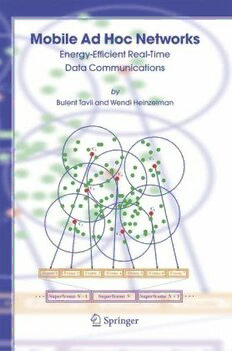
Mobile Ad Hoc Networks; Energy - Efficient Real -Time Data Communications PDF
280 Pages·2006·2.977 MB·English
Most books are stored in the elastic cloud where traffic is expensive. For this reason, we have a limit on daily download.
Preview Mobile Ad Hoc Networks; Energy - Efficient Real -Time Data Communications
Description:
A Mobile Ad Hoc Network (MANET) is an autonomous system of mobile nodes connected by wireless links to form a communication network. The challenge in the design of protocol architectures for MANETs is to provide a certain level of Quality of Service (QoS) in information transfer using the limited network resources, namely energy and bandwidth. This design goal is further constrained by the unreliable physical channel, the mobility of the nodes, and the lack of infrastructure for network coordination. To meet the QoS requirements for real-time data communication, some coordination of the channel is needed, but centralized coordination is not feasible in MANETs. Furthermore, since a MANET is a dynamic, distributed entity, the optimal control of such a system should also be dynamic and adaptive. This book presents the Time Reservation using Adaptive Control for Energy Efficiency (TRACE) family of protocol architectures that provide such dynamic coordinated channel access in a distributed manner, enabling energy-efficient, real-time data communications in MANETs. Furthermore, this book provides an introduction to the fundamentals of MANETs, an overview of protocols for each layer of the protocol stack, and a discussion of the issues involved with energy-efficient protocol design and quality of service for real-time data transmission.
See more
The list of books you might like
Most books are stored in the elastic cloud where traffic is expensive. For this reason, we have a limit on daily download.
